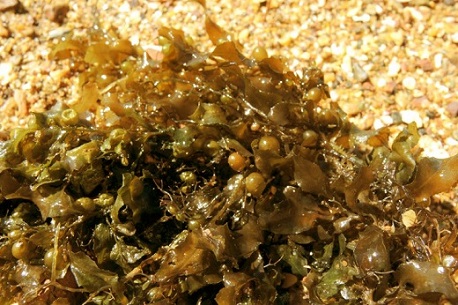Thailand medical researchers discover breakthrough in stroke recovery using marine algae
Nikhil Prasad Fact checked by:Thailand Medical News Team Oct 01, 2024 1 year, 3 months, 23 hours, 55 minutes ago
Thailand Medical: A New Hope for Stroke Recovery
In a groundbreaking study, researchers from Chiang Mai University and Burapha University have discovered that extracts from marine brown algae, particularly Sargassum polycystum, show promising results in enhancing cognitive function in rats recovering from ischemic stroke. This
Thailand Medical News report delves into the potential of these marine-derived compounds, offering hope for the future of stroke treatment.
 Thailand medical researchers discover breakthrough in stroke recovery using marine algae
Thailand medical researchers discover breakthrough in stroke recovery using marine algae
Stroke is one of the leading causes of cognitive impairment globally. Researchers have long sought new therapies to mitigate the devastating effects of stroke on the brain, particularly in the hippocampus, the area responsible for memory and cognitive function. This article sheds light on a study that explored the use of phenolic-rich brown algae extracts as a potential treatment for cognitive deficits after stroke.
Study Background and Objectives
The study, conducted by Dr. Jurairat Khongrum and her team at Chiang Mai University, along with Dr. Pratchaya Kaewkaen from Burapha University, focused on testing the neuroprotective and antioxidant effects of Sargassum polycystum in rats suffering from ischemic stroke. They were particularly interested in how this seaweed could inhibit the harmful S100B protein and oxidative stress in the brain.
The goal of the study was to investigate whether these algae could improve cognitive function by reducing oxidative stress and S100B expression, two key factors that contribute to stroke-induced brain damage.
What is S100B?
S100B is a calcium-binding protein that is often used as a biomarker for brain damage and diseases like Alzheimer’s. Elevated levels of S100B have been associated with brain injuries and neurodegenerative conditions. In the context of stroke, high S100B levels indicate more severe brain damage. Therefore, finding ways to reduce S100B expression could significantly improve stroke recovery outcomes.
Key Study Findings
The research team used extracts from nine different species of seaweed, but the star performer was Sargassum polycystum. The algae extract was tested in a rat model of ischemic stroke, where rats were given the extract in doses of 100, 300, and 500 mg/kg of body weight. The rats were then put through a series of cognitive tests, including the Morris water maze and novel object recognition tests, both of which are standard methods for assessing memory and learning in rodents.
Significant findings:
-Improved Cognitive Function: Rats treated with Sargassum polycystum showed significant improvement in cognitive performance compared to those that did not receive the extract. This was evident in their ability to navigate the Morris water maze faster and more accurately, indicating enhanced spatial memory.
-Reduced Oxidative Stress: One of the major cau
ses of brain damage following a stroke is oxidative stress, which leads to the generation of free radicals that attack brain cells. The algae extract significantly increased the activity of antioxidant enzymes such as superoxide dismutase (SOD), catalase (CAT), and glutathione peroxidase (GSH-Px), which help neutralize free radicals. These enzymes saw an increase of over 50%, demonstrating the extract's powerful antioxidant properties.
-Lower S100B Levels: Perhaps most strikingly, the extract was able to reduce serum S100B levels by as much as 36.64%. This indicates that the seaweed may help protect against brain damage and improve neurological outcomes after a stroke.
How Sargassum polycystum Works
The study highlights that Sargassum polycystum is rich in phenolic compounds, particularly gallic acid, which is known for its antioxidant and neuroprotective properties. Gallic acid can cross the blood-brain barrier, making it a valuable compound in protecting brain cells from oxidative damage. In addition, phenolic compounds in Sargassum polycystum help reduce the production of harmful proteins like S100B, further protecting the brain from post-stroke damage.
This reduction in oxidative stress and S100B expression suggests that the seaweed extract may have both immediate and long-term benefits for stroke recovery. By protecting brain cells from damage, the extract could help preserve memory, learning, and other cognitive functions that are often impaired after a stroke.
Implications for Human Health
Though the study was conducted in rats, the results are highly promising for human applications. If further research supports these findings, Sargassum polycystum could become an essential part of stroke recovery therapies. The use of natural, marine-derived compounds offers a novel approach to treating cognitive impairments, with fewer side effects than traditional synthetic drugs.
Dr. Khongrum from the Multidisciplinary Research Institute at Chiang Mai University expressed optimism about the potential for these findings to pave the way for new, more effective treatments for stroke patients. She noted that “Sargassum polycystum has shown a lot of promise as a functional ingredient for neuroprotective therapies, and we are excited to explore its potential further.”
Conclusion and Future Directions
The discovery that marine algae extracts can improve cognitive function in stroke patients opens up new avenues for research and treatment. Sargassum polycystum, with its high levels of phenolic compounds and antioxidant properties, may become a valuable natural therapy for stroke recovery.
However, more research is needed to confirm these findings in human trials. The researchers plan to conduct further studies to isolate the specific compounds responsible for these neuroprotective effects and to understand how they can be most effectively administered to stroke patients.
In conclusion, the study provides compelling evidence that marine algae, particularly Sargassum polycystum, may hold the key to developing new therapies for stroke recovery. Its ability to reduce oxidative stress, inhibit harmful proteins like S100B, and improve cognitive function positions it as a potential game-changer in the field of neuroprotective treatments.
The study findings were published in the peer-reviewed journal: Marine Drugs.
https://www.mdpi.com/1660-3397/22/10/451
For the latest research news, keep on logging on to Thailand
Medical News.
Read Also:
https://www.thailandmedical.news/news/thailand-medical-study-links-air-pollution-to-increased-liver-cancer-mortality
https://www.thailandmedical.news/news/thailand-medical-researchers-find-that-huperzine-a-from-huperzia-serrata-moss-can-help-combat-alzheimer-s-disease
https://www.thailandmedical.news/news/thailand-medical-study-validates-anti-inflammatory-claims-of-yataprasen-a-thai-traditional-herbal-medicine
